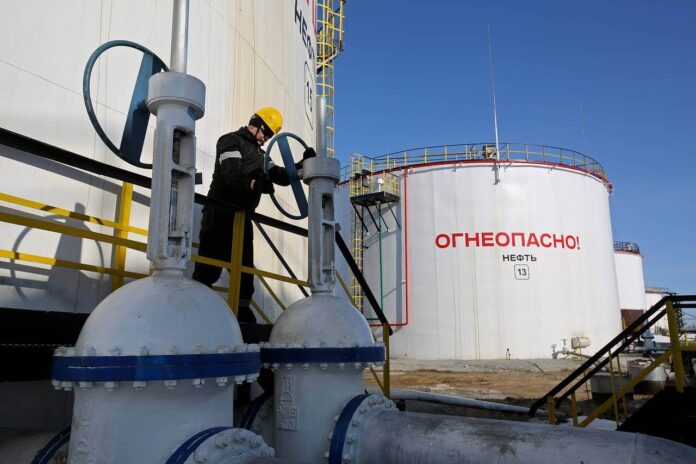Russia’s oil and gas revenue has seen a dramatic increase. According to a recent Bloomberg report, Russia’s total oil and gas revenues in April soared by 90% year-over-year, amassing a substantial 1.23 trillion rubles ($13.5 billion). This financial windfall has significantly boosted the Kremlin’s energy-related taxes, which escalated to 1.053 trillion rubles ($11.5 billion), marking a 111.9% increase from April of the previous year.
This revenue boost primarily hinges on the surge in Urals crude prices, which averaged $70.34 per barrel, up sharply from $48.67 a year earlier—just after the G-7 countries implemented a price cap of $60 per barrel on Moscow’s oil exports. The financial landscape for Russia is further shaped by the depreciation of the ruble, which fell by 20.5% against the dollar, intensifying the local impact of dollar-denominated oil sales.
Bloomberg Economics attributes this resilience in revenue to a confluence of factors, including robust global demand, tight supplies exacerbated by geopolitical uncertainties, Russia’s strategic development of new export infrastructures, and stringent controls over the cash flows of exporters.
Projected to reach around $126 billion in 2024, Russia’s oil and gas tax revenue is pacing slightly above governmental forecasts, reflecting Moscow’s adept navigation through the web of international sanctions. As the conflict in Ukraine persists with no end in sight, Russia’s economic strategies to sustain its military efforts are increasingly under the microscope.
Strategically, Russia has been expanding its export networks, particularly fostering relationships with countries like China, India, and nations in the Persian Gulf. China plays a crucial role in helping Russia skirt sanctions, not only by facilitating the operations of Moscow’s “dark fleet” of crude tankers, which covertly flout international maritime regulations, but also by promoting Renminbi transactions between the two countries, thereby reducing reliance on Western financial systems.
Despite these maneuvers, Russia observed a slight dip of about 6.4% in oil and gas revenue from March to April, primarily due to significant subsidies extended to domestic fuel producers. This nuanced financial landscape underscores the complex interplay between international sanctions and Russia’s strategic economic responses, illustrating the ongoing challenges in curbing Moscow’s financial avenues amidst prolonged conflict.

